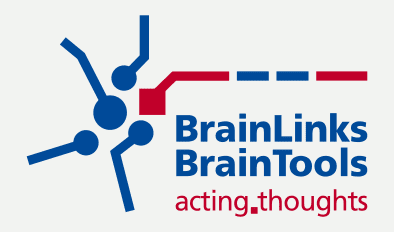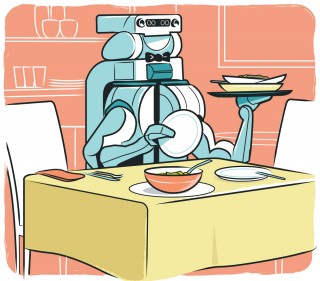Current Projects - Alphabetically ordered
Memory Consolidation in Learning Robots
![]() Memory Consolidation in Learning Robots
Memory Consolidation in Learning Robots
In this project, we are focusing on a new architecture for memory-based RL. This architecture has two main features: a filtering mechanism for a more efficient use of memory based learning by focusing on relevant data as well as a short term memory containing the recent history of the agent in a condensed form to guide decision making. Read more...
NetControl: Autonomous Control of Network Activity
 NetControl: Autonomous Control of Network Activity
NetControl: Autonomous Control of Network Activity
This project aims to explore techniques to autonomously control activity dynamics in “in vitro” neuronal networks using electrical stimulation and machine learning (reinforcement learning) paradigms. The control goal shall be to induce, or maintain ‘desired’ activity patterns while preventing ‘undesirable’ ones. This project is a collaborative effort of the Laboratory for Biomicrotechnology, the Machine Learning Lab and the Computer Architecture Group.
NeuroBots: Brain-controlled Intelligent Robotic Devices
 NeuroBots: Brain-controlled Intelligent Robotic Devices
NeuroBots: Brain-controlled Intelligent Robotic Devices
As part of the BrainLinks-BrainTools Cluster of Excellence, the aim of the NeuroBots project is to develop methods and technologies for brain-controlled intelligent autonomous robotic devices like robot arms or mobile platforms. Within this setting, we are applying methods of machine learning to acquire reliable closed-loop control for grasping skills and for adapting to changing environments. Read more on BrainLinks-BrainTools' homepage...
Optimized Early Seizure Detection for a Closed Loop Intervention Device in Epilepsy
 Optimized Early Seizure Detection for a Closed Loop Intervention Device in Epilepsy
Optimized Early Seizure Detection for a Closed Loop Intervention Device in Epilepsy
This project aims at the development of a smart energy-autonomous micronode (SEAM) as a device for closed-loop interventions in patients with focal epilepsy. An essential part of such a device is the development of the afferent part of the closed-loop intervention system, i.e. online analysis of continuous intracranial EEG signals for detection of ictal electrographic patterns on which triggering of an intervention can be based. This collaborative project of Epilepsy Center, Machine Learning Group and IMTEK/Energy Harvesting Group will optimize seizure detection for integration into a SEAM device.
Past Projects - Chronologically ordered
Tidy Up Robot
 Mobile Manipulation in natural environments -- TidyUpRobot
Mobile Manipulation in natural environments -- TidyUpRobot
The project Mobile manipulation in natural environments – “TidyUpRobot” was part of a larger project involving several groups at University of Freiburg in the context of the Willow Garage PR2-Beta program. As one of 11 selected projects worldwide, its goal was to foster the state-of-the-art in personal mobile robotics. Read more...
Multi-Agent Production Scheduling
![]() Multi-Agent Production Scheduling
Multi-Agent Production Scheduling
In this project, we focus on the application of machine learning approaches that enable independently learning agents to cooperatively solve production planning and scheduling problem in a distributed manner. We address both the foundational, decision-theoretic perspective on decentralized decision-making (like learning in DEC-MDPs) as well as the practical application of adaptive multi-agent systems for job-shop scheduling problems. Read more...
NeuroRacer: Beating humans in slot-car racing
![]() NeuroRacer: Beating humans in slot-car racing
NeuroRacer: Beating humans in slot-car racing
We use a slot-car race track as a benchmark for our reinforcement learning methods.
Approximate Transition Graphs
Instance- and case-based methods feature certain advantages when used as a tool for function approximation in the context of value function-based reinforcement learning. In this line of research, our focus is on methods where the state or state-action value function is represented by a finite set of samples forming approximate state tansition graphs. Read more...
Learning Algorithms for Cooperative Multi-Agent Systems
![]() Learning Algorithms for Cooperative Multi-Agent Systems
Learning Algorithms for Cooperative Multi-Agent Systems
The notion 'Multi Agent Reinforcement Learning' subsumes learning techniques, which enable agents to acquire cooperative decision policies automatically - based on a specification of the system's desired overall behavior. Read more...
CLSquare: Closed Loop Simulation System
![]() CLSquare: Closed Loop Simulation System
CLSquare: Closed Loop Simulation System
Download our Open Source Closed Loop Simulation System CLS2 for training and testing your learning controller. Version 2.5 is now available and includes new ready-to use RL-controllers.
Reinforcement Learning in Realtime
![]() Reinforcement Learning in Realtime german
Reinforcement Learning in Realtime german
Ziel dieses Projekts ist es, Methoden bereitzustellen, die eine drastische Reduzierung der zum Training benötigten Erfahrungssequenzen erlauben. Hierbei kommt es uns nicht so sehr auf die Reduzierung der Gesamttrainingszeit, sondern vorrangig um die Reduzierung der Interaktionen mit dem zu steuernden System an.
RL in real, distributed, and cooperative Environments
![]() RL in real, distributed, and cooperative Environments
RL in real, distributed, and cooperative Environments
Within the DFG SPP 1125 we are investigating Reinforcement Learning methods for real robots. Especially, we have two goals for our research: A) to develop learning methods, that are fast and robust enough to be applicable directly to real robots. B) to investigate algorithms for the learning of team behaviour in distributed multi-agent systems.
Classification of Nuclear Contamination Data
![]() Classification of Nuclear Contamination Data
Classification of Nuclear Contamination Data
In this joint project with the Federal Research Center for Nutrition we were faced with the task of classifying data in terms of trustworthyness. Due to the large amount of data, an automatic classification tool was developed. This field of research is also known as Novelty detection, Outlier Detection, or Single-class classification.
Sales rate Preditiong
 Sales Rate Prediction and Automatic Disposition
Sales Rate Prediction and Automatic Disposition
In this joint project with the Axel-Springer-Verlag, we develop a system based on machine learning techniques aimed at predicting the daily sales rates of newspapers. The task comprises forecasting thousands of timeseries for individual sales agents differing in many facets like the average sales level, the noise ratio, seasonal changes, and individual characteristics of the respective retailer. Read more...
Brainstormers Tribots
Robotic soccer is an ideal testbed for our vision of learning and adaptive mobile robots. The challenges are manifold: uncertainty in sensors and actuators, complex and nonlinear kinematics and dynamics, huge state space, hostile robots and the need for team cooperation with other robots. Read more...
Brainstormers 2D
Robotic soccer is an ideal testbed for our vision of learning and adaptive computer programs. The Brainstormers robotic soccer project was established in 1998, starting with a team competing in the soccer simulation league. Read more...
Reinforcement Controllers in Technical Applications
![]() Reinforcement Controllers in Technical Applications
Reinforcement Controllers in Technical Applications
The idea of Reinforcment Learning controllers in feedback control loops is extremely attractive: The designer only specifies the target value(s) - the controlling agent learns to fulfill this goal incrementally from the experience of success or failure. With the approach of using neural networks as the basis of such a reinforcement learning agent, we could show that these controllers are able to successfully learn in very complex and nonlinear control situations.

